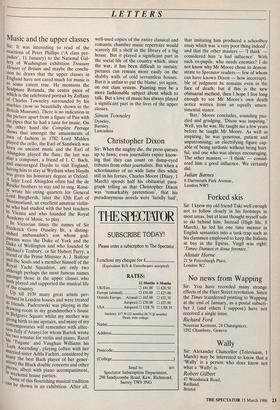LETTERS Music and the upper classes
Sir: It was interesting to read of the reactions of Peter Phillips CA class pre- judice', 11 January) to the National Gal- lery of Washington exhibition Treasure Houses of Britain and maybe the conclu- sion he draws that the upper classes in England have not cared much for music is to some extent true. He mentions the Sculpture Rotunda, the centre piece of Which is the celebrated portrait by Zoffany of Charles Towneley surrounded by his marbles (now so beautifully shown in the British Museum). There is no indication in the picture apart from a figure of Pan with his Pipes that he had a taste for music. On the other hand the Complete Peerage Shows that amongst the amusements of Men of fashion in 1782 Lord Malden Played the cello, the Earl of Sandwich was keen on ancient music and the Earl of Abingdon played the flute; the last was also a composer, a friend of J. C. Bach, and encouraged Haydn to visit England, having him to stay at Wytham when Haydn was given his honorary degree at Oxford. A later Lord Abingdon often had the de Reszke brothers to stay and to sing. Rossi- ni wrote his string quartets for General Lord Burghersh, later the 12th Earl of Westmorland, an excellent amateur violin- 1St who had studied with the best teachers in Vienna and who founded the Royal Academy of Music, to play. In Victorian times the names of Sir Frederick Gore Ouseley Bt, a disting- uished ambassador's son whose god- Parents were the Duke of York and the buke of Wellington and who founded St fvlichael's Tenbury, or Sir Hubert Parry, a friend of the Prime Minister A. J. Balfour and the Souls and a member himself of the Royal Yacht Squadron, are only two although perhaps the most famous names Laniongst those in the upper classes who °0th played and supported the musical life of the country. , UP till 1939 many great artists per- 1.°rmed in London houses and were treated as friends. Paderewski was playing in the drawing-room in my grandmother's house in Belgrave Square whilst my mother was giving birth to me upstairs, and many of my • c(). ntemporaries will remember with affec- 9n Jelly d'Aranyi for whom Bartok wrote nis two sonatas for violin and piano, Ravel s 'Tsigane' and Vaughan Williams his 'Lark Ascending', playing (often with her married sister Adila Fachiri, considered by Man)/ the best Bach player of her gener- a!ien) the Black double concerto and other Pieces, albeit with piano accompaniment, in Weekend house parties. None of this flourishing musical tradition fl be shown in an exhibition. After all, well-used copies of the entire classical and romantic chamber music repertoire would scarcely fill a shelf in the library of a big house. But it played a significant part in the social life of the country which, since the war, it has been difficult to sustain: pictures can remain more easily on the shabby walls of cold servantless houses. But it is unfair to put the blame, yet again, on our class system. Painting may be a more fashionable subject about which to talk. But a love of music has always played a significant part in the lives of the upper classes.
Simon Towneley
Dyneley, Burnley, Lancashire


















































 Previous page
Previous page